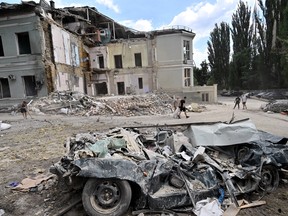The girl can stay in Windsor, Ont., in part because of the danger she’d face if returned to her father in Ukraine, an Ontario court ruled
Article content
Like millions of other Ukrainians, Marharyta Kosenkova fled the war-torn country in 2022, hoping to give her young daughter a safer, more stable life. Unlike many, she took the girl across borders — ending up in Canada — without the father’s permission.
Kosenkova violated an international abduction treaty when she did so, an Ontario Superior Court judge ruled recently in an intriguing child-custody case. But Justice Ross Macfarlane said the girl can nevertheless stay in Windsor, Ont., in part because of the danger she’d face if returned to her father in Ukraine.
Advertisement 2
Article content
Daughter Mariia, now six, is attending kindergarten in Windsor and would be harmed “both socially and academically” if moved from her current home and school, said her teacher in an affidavit.
“There is a grave risk that returning Mariia to her habitual residence in Ukraine would expose her to physical or psychological harm or otherwise place her in an intolerable situation,” said Macfarlane. “There is an additional intolerable risk of psychological harm associated with uprooting Mariia from the care of her mother, who has been her primary caregiver for her entire life and has expressed no intention to return to Ukraine.”
Recommended from Editorial
Aileen Manalang, lawyer for the husband, Oleksii Kosenkov, could not be reached for comment. Kosenkova’s lawyer, Mary Anne Ducharme, had not obtained permission from her client to speak about the case by deadline.
The dispute underscores how the war has not only exacted a terrible toll in bloodshed and physical destruction, but shaken the Ukrainian family structure, too. An estimated 6.6 million refugees remain outside of the country, almost 80 per cent of them women and children, according to the United Nations High Commission for Refugees. Ukrainian law requires most men to stay behind and help defend against the Russian invasion.
Article content
Advertisement 3
Article content
Mariia was born in Kharkiv, Ukraine’s second city. Her parents, Kosenkova and Kosenkov, separated in 2020 and divorced the next year. Kharkiv from the start of the 2022 invasion was a major target for Russia, and it has faced relentless attacks since Moscow launched a new offensive this May. About half the population has left.
The family initially moved to a town 100 kilometres southwest of Kharkiv. But in June 2022, Kosenkova decided she had to get Mariia out of the country and fled first to Poland, then Germany and finally to Canada under its special temporary-resident program for displaced Ukrainians.
“Without the war I would have sought the consent of (Kosenkov) because he was the father and it would have been appropriate and required by law,” she said in an affidavit. “But there was chaos everywhere.”
Despite the chaos and the fact the Ukrainian government said children could be taken out of the country without the other parent’s consent, Macfarlane ruled that Kosenkova had violated the Hague Convention, the international treaty governing child abductions across borders.
Advertisement 4
Article content
But the judge cited two exceptions to the treaty that meant he would not order the girl removed.
Kosenkov failed to apply for her return within the requisite one year, while Mariia appears to be “settled” in her new home. There’s evidence she is doing well at school, has made friends, is learning English and entered swimming and figure-skating classes, the judge noted.
The treaty also makes an exception if returning the child to their home country would put them in physical or psychological danger.
Kosenkov initially applied to have her come to live with him in Kharkiv itself, though later said he would move to Kyiv and stay there with the girl at a relative’s apartment. He also offered to provide her professional counselling to deal with the trauma of her international moves.
Macfarlane noted that even Kyiv is frequently attacked, pointing to an affidavit from a friend of Kosenkova’s, which included photos of an apartment building next to hers that was hit by a Russian missile and another close by that was bombed this year.
The ruling is “well-reasoned and makes sense,” said Calgary lawyer Max Blitt, a leading authority on the Hague Convention.
Advertisement 5
Article content
The father’s two main mistakes were failing to apply under the convention much earlier, and not promising to move to somewhere in Western Ukraine, which has been less affected by the war. Even then “it may not have been enough,” said Blitt.
Although her initial residency permit expires in December of next year, the mother plans to apply for extensions and would like to make Canada her permanent home, said Macfarlane’s decision.
Our website is the place for the latest breaking news, exclusive scoops, longreads and provocative commentary. Please bookmark nationalpost.com and sign up for our daily newsletter, Posted, here.
Article content








